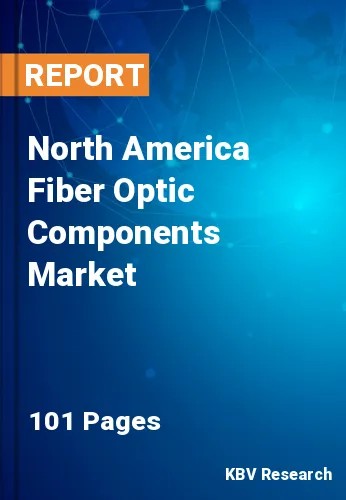The North America Fiber Optic Components Market would witness market growth of 7.5% CAGR during the forecast period (2021-2027).
Increased deployment of the data centers across the region is driving the growth of the fiber optic component market. Fiber optic components are utilized for intra data center and inter data center communications. The optical line that connects two data centers can span thousands of kilometers and also need high transmission rates. Therefore, the data centers need high data bandwidth to transmit a large amount of data over long distances which is leading to the increase in demand for fiber optic components to use in data centers.
In addition, fiber broadband is considered as the fastest way to deliver high speed internet to businesses and residences. Same as cable, fixed wireless and DSL, the fiber broadband connections bridge the last mile between the mainstream internet and the users’ residence. The DSL & cable use existing phone and TV infrastructure as frequency vibrations to transfer data over copper wires, and the fiber networks use light to transmit data over specialized cables packed with glass fibers. Digital data is stored in zeros & ones also known as binary.
Everything seen on the web is the product of streams of binary information such as the dots and dashes of morse code. Transmitting that binary stream data through light pulses is straightforward that is; a pulse represents 1 and no pulse means 0. Fiber optic cables are developed to transmit those pulses rapidly to long distances. The inside of a fiber optic cable is packed with glass made optical fibers as thick as human hair.
The number of broadband connections shows the number of high speed internet connections that need fiber optic cables. Enhanced broadband connections can help in boosting the revenue of the industry because the operators purchase new fiber optic cables in order to serve with high speed internet to customers. The number of broadband connections is anticipated to increase in 2020 which may result in the growth of the fiber optic components market in the North America region.
Furthermore, in the United States, slow telco fiber deployment & an initial focus on FTTC, cable’s strong grip on the market with the continuous network upgrades into DOCSIS 3.1, that enables speeds of up to 1 Gbps, and double/ triple play bundles has also supported the low availability & take up of FTTP. The fiber optic cables are used by more than two-third of the wireless broadband subscribers in the United States.
The US market dominated the North America Fiber Optic Components Market by Country in 2020, and would continue to be a dominant market till 2027; thereby, achieving a market value of $9,613.2 million by 2027. The Canada market is poised to grow at a CAGR of 10% during (2021 - 2027). Additionally, The Mexico market would expect a CAGR of 9% during (2021 - 2027).
Based on Component, the market is segmented into Transceivers, Cables, Active Optical Cables, Connectors, Amplifiers, Splitters & Circulators and Others. Based on Application, the market is segmented into Communications, Distributed Sensing, Lighting and Analytical & Medical Equipment. Based on Communications Type, the market is segmented into Telecommunications, Data Centers and Enterprises. Based on countries, the market is segmented into U.S., Mexico, Canada, and Rest of North America.
Free Valuable Insights: The Global Fiber Optic Components Market is Estimated to reach $36.3 Billion by 2027, at a CAGR of 8.1%
The market research report covers the analysis of key stake holders of the market. Key companies profiled in the report include Sumitomo Electric Industries, Ltd., Furukawa Electric Co., Ltd., II-VI Incorporated, Amphenol Corporation, Fujitsu Limited (Fujitsu Optical Components Limited), Broadcom, Inc., Lumentum Holdings, Inc., TE Connectivity Ltd., EMCORE Corporation, and Accelink Technology Co. Ltd.
By Component
By Application
By Country
Our team of dedicated experts can provide you with attractive expansion opportunities for your business.

